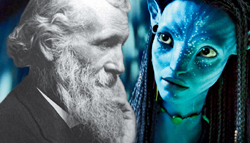sierraclub.org - sierra magazine - march/april 2010 - spout


Spout | Rant, React, Chat, Blather
We Don't Need No 3-D Glasses | Letters
We Don't Need No 3-D Glasses
 John to Neytiri: "Why so blue?"
John to Neytiri: "Why so blue?" I finally saw Avatar. In 3-D. On an 80-by-100-foot Imax screen. With--Swish! Clomp! Boom!--bone-rattling, state-of-the-art digital sound.
Afterward I found myself thinking about the days I'd recently spent locked in one of the Sierra Club's fluorescent-lit offices in Washington, D.C. Magic Markers had slashed wild chicken scratch across wall after wall of whiteboard. PowerPoints had come at us like machine gun fire. The stench of adrenaline in the stagnant air had been enough to curl our name tags.
I mock. Don't be fooled, though. The two dozen Sierra Club activists, lawyers, and lobbyists strategizing ways to replace mountain-destroying, climate-disrupting coal energy with wind, solar, and geothermal power are real-world eco-warriors. They're as impassioned and fierce as the Na'vi who ride gigantic birds into battle against the evil military-industrial complex that would blast and bulldoze pristine Pandora's glowing Tree of Souls.
For a year or so this magazine has been documenting the Sierra Club's 100-plus victories over proposed new coal plants. Now the Club's Beyond Coal campaign is on the charge against the existing plants that so recklessly contribute to the deterioration of Earth's climate and quality of life. But (to throw in a cliche worthy of a sci-fi action flick) the ragtag band of underdog heroes can't do it alone.
A story by sociologist Amitai Etzioni in the New Republic introduced me to the term "moral megalogues"--vast, cross-media societal conversations that help us sort out our national and global problems. I think Avatar--as naive and weirdly misanthropic as it is in places--will bump the discussion of our shared fate to a new level, just as its animation has nudged entertainment technology up a notch.
I also saw an unintentional cautionary tale. Avatar's dramatic clout comes from its success in emotionally connecting viewers to the indigenous tribes' reverence for the symbiotic natural world. Those neon flowers and wondrous floating mountains are poetic touchstones for this planet's equally awesome wonders.
But as my son and I stumbled out of the theater and into a lobby filled with squawking arcade games, I fretted that many of our fellow audience members might never have experienced a real forest and so might be content to engage with pixilated pseudo-nature. And if they truly believe virtual wilderness is an adequate substitute, there's no good reason for them to gather the gumption to support--or join--our fight.
Sierra Club activists battle on against coal plants and other despoilers because they know this: Beyond those stuffy conference rooms is a world where bright-blue birds really do flit through 10-story trees, where waterfalls refract light in ways that invigorate and inspire. And we get to view real nature through cool Ray-Bans, not cheesy 3-D shades.
—Bob Sipchen, editor in chief
Letters
LIZARD MEMORIES
I just got done reading your Tejon article ("Where the Wild Things Are. Still," January/February), and wow, what memories it brings back. The trigger is the image of the horned lizard (we called them horned toads), which my brother and I used to catch and play with when we homesteaded five acres of land on the foothills south of Lucerne Valley, California.
My parents were young desert rat/rock hounds back in the 1940s, as well as High Sierra campers. My brother and I camped and hiked in the mountains around Lake Tenaya, where we fished for beer cans with magnets and made chains from discarded pop-top tabs. My wife and I continue to pick up trash as we travel throughout the United States, hiking and paddling our tandem kayak.
Vard Whittick
Via e-mail
Unfortunately, the deal that created the Tejon Ranch Conservancy did nothing but preserve land that the owners had no intention of developing at the cost of destroying the core of the biological linkage between the Sierra and Coast Ranges that the deal's proponents proclaim is so essential about the ranch. This deal is supported by aged baby boomer activists who have mastered the art of compromise, and I'm surprised the Sierra Club endorsed it. It's like buying the Grand Canyon just for the view and letting the previous owners continue to use the Colorado River as a toxic-waste dump. I believe, in the words of Dave Foreman, that there is "no compromise in defense of Mother Earth."
Scott Werner
Ojai, California
GREEN DIAPER BABIES
I enjoy reading Mr. Green's "Ask" column each month. One thing he forgot to mention, in response to the question of whether cloth or disposable diapers are better for the environment (January/February), is memories. I can't help getting misty when I wipe my hands off in the garage with a 30-year-old diaper from my daughter. It's got to be the last one around this house, but it has a lot of memories from a brief period of my life and is still useful to this day.
Allen E. Horner
Southington, Connecticut
CORRECTIONS
"The West Without Coal" (January/February) misstated the amount of CO2 emitted by the Navajo Generating Station; it is 20 million tons per year. The article also incorrectly named the wires transmitting Navajo's electricity to Los Angeles, which are of the 500-kilovolt variety, and the title of author Paul Tullis's blog, which is trueslant.com/paultullis.
CONTACT US
E-mail sierra.letters@sierraclub.org or write to us at 85 Second St., 2nd Floor, San Francisco, CA 94105. Please include your name, city, and e-mail address or daytime phone number. Letters may be edited for length and clarity.
John Muir photo, courtesy of the Sierra Club Library; Neytiri (Zoe Saldana) photo, courtesy of Twentieth Century Fox